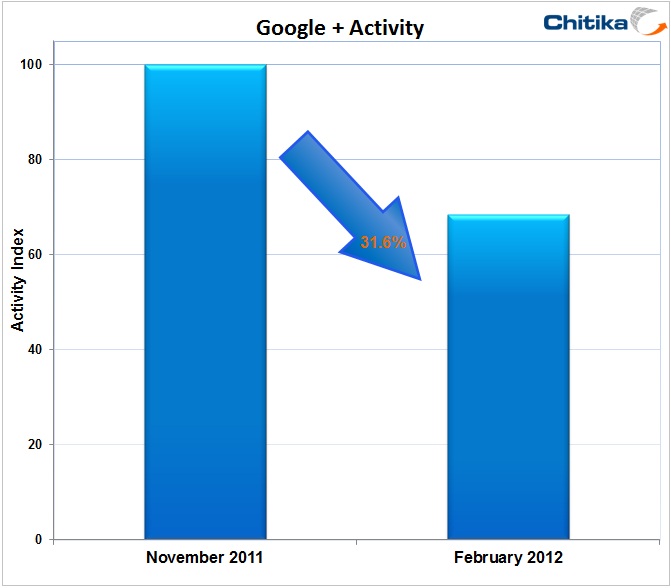Google+ has experienced quite the tumultuous ride since its introduction in June 2011. In the words of Google’s Chief Executive, Larry Page, Google+ “has become a robust competitor in the social networking space, with 90 million users registering since its June launch.” However, a recent report by ComScore tells a different story, highlighting a downward trend in overall use. Members of the social network spent 5.1 minutes on the site in November, and 4.8 minutes in December. By January, users were spending only 3.3 minutes on Google+ per month, on average.
Google+ has experienced quite the tumultuous ride since its introduction in June 2011. In the words of Google’s Chief Executive, Larry Page, Google+ “has become a robust competitor in the social networking space, with 90 million users registering since its June launch.” However, a recent report by ComScore tells a different story, highlighting a downward trend in overall use. Members of the social network spent 5.1 minutes on the site in November, and 4.8 minutes in December. By January, users were spending only 3.3 minutes on Google+ per month, on average.
Chitika Insights has been regularly monitoring the progress of the fledgling social network since its debut. In light the recent ComScore figures depicting lower user engagement, Chitika Insights conducted a follow up study focusing on activity coming out of Google+.
To quantify this study, Chitika Insights analyzed hundreds of millions of ad impressions coming out of the Chitika Ad network over the past several months. The Chitika Ad network is composed of a large and diverse set of publishers that pose a fair representation of overall traffic on the internet. To estimate activity coming out of Google+, Chitika Insights analyzed the site using a referrer distribution (of which a detailed explanation is available here). In this study, an activity analysis of traffic seen coming out of Google+ is compared using a four month time frame. A graph depicting this analysis can be seen below:

This graph above shows an activity index for Google+ comparing November 2011 to February 2012, a four month period. The highest level of activity observed receives a value of 100, and the other data points are a function thereof. The arrows represent the percentage change in activity seen over the time period analyzed. Comparing current Google+ traffic levels to those seen four months ago reveals an overall 31.67% decline in activity.
The overall decline in activity on Google+ is troubling — particularly for Google, given the multi-million dollar advertising campaign designed to promote it as an alternative to Facebook. One of the factors surrounding the decline in Google+ activity may be that the major markets for social media are reaching saturation. Simply put, “nobody wants another social network right now,” said Brian Solis, an analyst at social-media advisory firm Altimeter. Social networks and their users alike may find that what matters most is connections and environments we build for ourselves, not the structure of the site. “The problem for Google is that people are still wedded to their Facebook lives,” said Greg Sterling, principal with Sterling Market Intelligence. Furthermore, brand engagement on Google+ does not have the same degree of energy as seen on Facebook. Intel said that that while it has over 300,000 subscribers on Google+, the comments it sees number in the tens. Compared to the thousands of user actions Intel sees on its Facebook page, the results are troubling.
All hope is not lost. After all, Google may not be measuring its success in terms of user engagement. The development of Google+ and its deep integration within Google’s broad platform of services aims to provide a means to expand the available data set of all users who choose to interact with the Google network. “Google thinks about the service not as a site but as a deepening of its relationship to billions of existing users who are already committed to Google’s services,” says Google spokesperson Katie Watson – and, “by this measure, engagement is already enormous.”